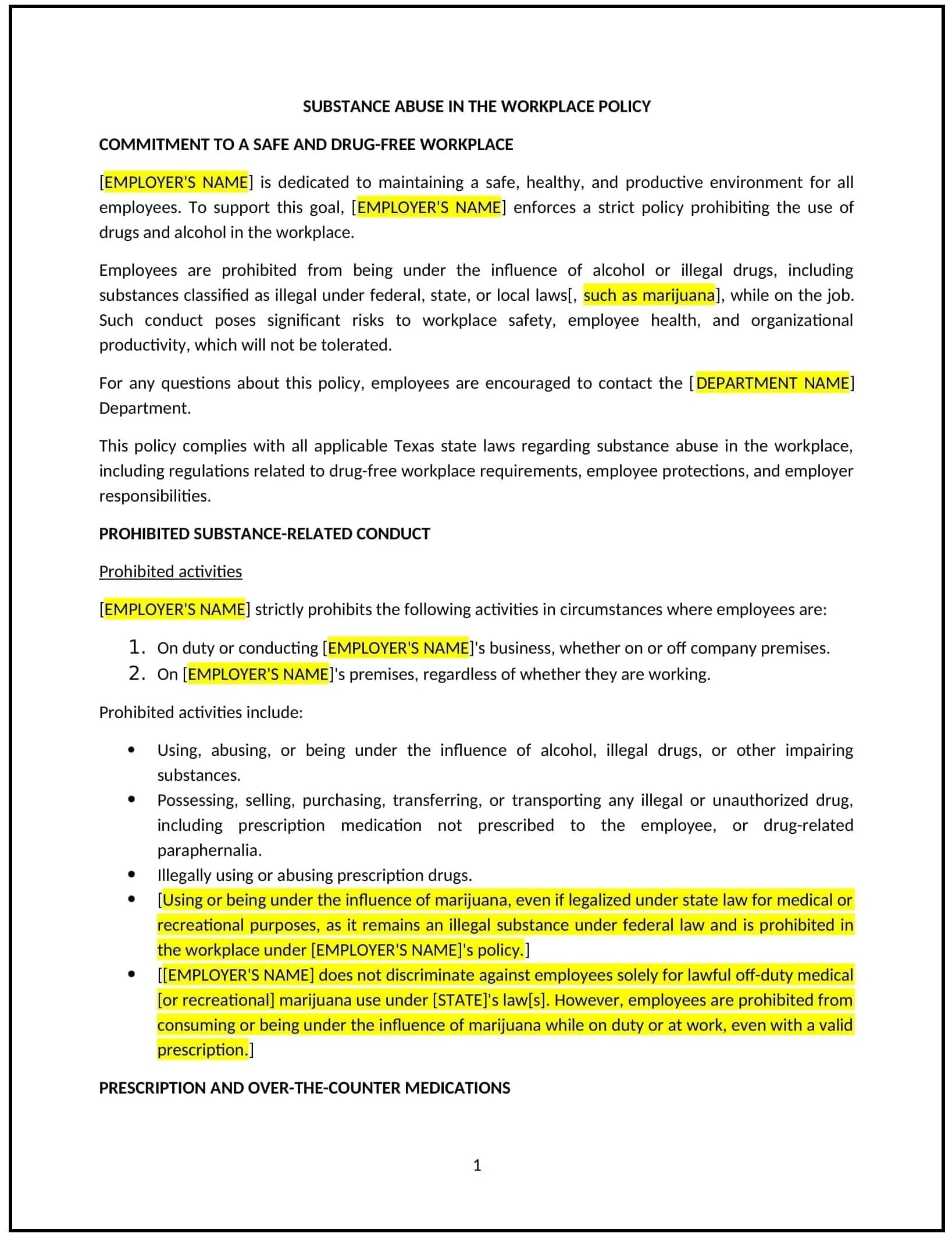Substance abuse in the workplace policy (Texas): Free template
Got contracts to review? While you're here for policies, let Cobrief make contract review effortless—start your free review now.

Customize this template for free
Substance abuse in the workplace policy (Texas)
This substance abuse in the workplace policy is designed to help Texas businesses establish clear guidelines for preventing, identifying, and addressing substance abuse issues among employees. The policy outlines the company’s stance on substance use, including alcohol, drugs, and other controlled substances, and the expectations for maintaining a drug-free and safe workplace.
By adopting this policy, businesses can promote a safe, healthy, and productive work environment, reduce the risk of workplace accidents, and comply with Texas state laws and federal regulations regarding substance abuse.
How to use this substance abuse in the workplace policy (Texas)
- Define substance abuse: Clearly define what constitutes substance abuse, including the use, possession, or distribution of illegal drugs, alcohol, prescription medications used improperly, or any other substances that impair an employee’s ability to perform their job.
- Outline prohibited behaviors: Specify the behaviors that are not acceptable in the workplace, such as being under the influence of drugs or alcohol while at work, using substances during work hours, or bringing illegal substances to work.
- Set expectations for employees: Outline the company’s expectations regarding substance use both during work hours and outside of work, especially in relation to how it impacts job performance, safety, and overall well-being.
- Establish a drug testing policy: Specify whether the company will conduct drug testing for new hires, random testing for current employees, or testing following workplace accidents. The policy should outline the circumstances under which testing may be required and the procedures for administering and handling tests.
- Promote employee assistance programs (EAPs): Offer resources for employees who may be struggling with substance abuse, such as confidential counseling, treatment programs, and support for rehabilitation. The policy should encourage employees to seek help without fear of retaliation or job loss.
- Address the disciplinary process: Clearly outline the steps that will be taken if an employee violates the substance abuse policy, including warnings, mandatory rehabilitation programs, suspension, or termination, depending on the severity of the infraction.
- Ensure confidentiality: Protect employees’ privacy by keeping any substance abuse-related information confidential and only sharing it with authorized individuals as necessary for health and safety reasons.
- Promote safety and health: Emphasize the importance of maintaining a safe and healthy workplace, where substance abuse is not tolerated due to its potential impact on employee safety, performance, and overall well-being.
Benefits of using this substance abuse in the workplace policy (Texas)
This policy offers several benefits for Texas businesses:
- Promotes workplace safety: By preventing substance abuse, businesses reduce the risk of workplace accidents, injuries, and unsafe conditions that can result from impaired employees.
- Increases productivity: A drug-free workplace ensures that employees can perform their jobs effectively, without the distractions or impairments caused by substance abuse.
- Enhances employee well-being: Offering assistance programs and creating a supportive environment helps employees address substance abuse issues and improves their overall health and job satisfaction.
- Reduces legal risks: By maintaining a clear substance abuse policy, businesses reduce the risk of legal issues related to substance abuse in the workplace, improving compliance with Texas state laws and federal regulations, such as the Drug-Free Workplace Act.
- Supports company reputation: Demonstrating a commitment to a safe and healthy workplace helps improve the company’s reputation as a responsible and ethical employer.
- Protects the company’s bottom line: A drug-free workplace can reduce absenteeism, turnover, and lost productivity associated with substance abuse, ultimately protecting the company’s financial interests.
Tips for using this substance abuse in the workplace policy (Texas)
- Communicate the policy clearly: Ensure that all employees are aware of the substance abuse policy and understand the expectations for behavior, the consequences of violations, and the resources available to employees struggling with substance abuse.
- Provide training and education: Offer regular training to employees on the dangers of substance abuse, the importance of maintaining a drug-free workplace, and how to recognize signs of impairment.
- Encourage employees to seek help: Promote a supportive workplace by encouraging employees to seek help through Employee Assistance Programs (EAPs) if they are struggling with substance abuse. Ensure that employees understand that seeking help will not result in retaliation.
- Enforce the policy consistently: Apply the substance abuse policy fairly and consistently across all employees to ensure that violations are addressed promptly and equitably.
- Monitor the effectiveness of the policy: Regularly assess the effectiveness of the substance abuse policy and make adjustments as needed to ensure that it continues to protect employees and the company.